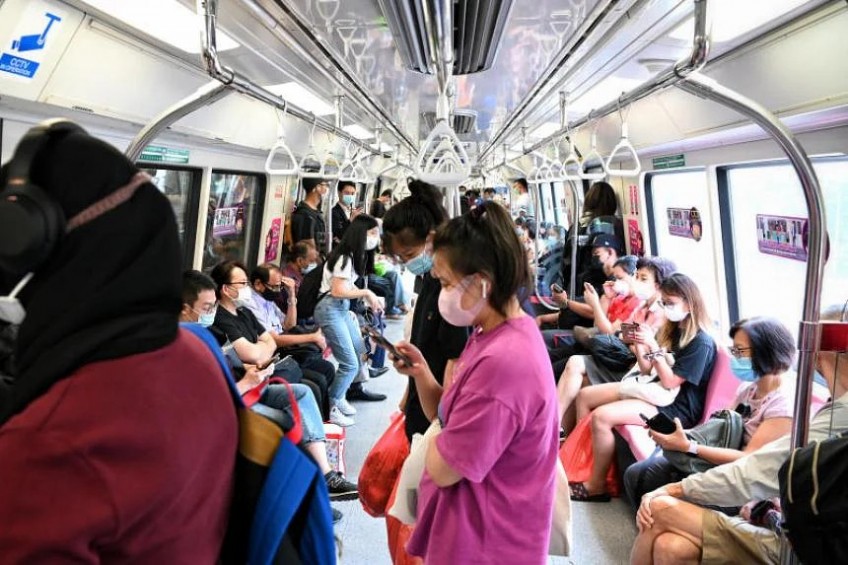Masks optional in most indoor settings from Aug 29: 7 things to know about Singapore's updated Covid rules


SINGAPORE - Mask-wearing indoors will no longer be a legal requirement except in healthcare facilities and public transport, and other settings that are likely crowded, enclosed and used by vulnerable persons.
This was among changes to safe management measures the multi-ministry task force tackling Covid-19 announced on Wednesday (Aug 24).
Here's what you need to know about the changes:
While mask-wearing indoors will no longer be legally required from Aug 29, they are still mandatory in places where essential services are carried out in enclosed and crowded areas, and which are frequently used by vulnerable persons.
These include healthcare facilities, residential care homes (including welfare and sheltered homes for the aged, as well as adult disability homes) and ambulances.
They also cover the indoor premises of hospitals and polyclinics, including retail, food and beverages (F&B) outlets, common areas and other facilities within the buildings.
Masks are also required in private primary care and dental facilities, specialist clinics, traditional Chinese medicine (TCM) clinics and renal dialysis centres.
Other settings where mask wearing is needed include clinical and radiological laboratories, day hospices, residential care homes, Covid-19 care facilities, testing centres and vaccination centres, and emergency ambulances and medical transport vehicles.
Masks also need to be worn on public transport, including trains, public buses and indoor public transport facilities, like boarding areas within bus interchanges and MRT platforms.
But mask-wearing on private transport modes, as well as school buses, private bus services and taxis, will be optional.
Those working as food handlers and in certain settings will continue to wear masks under sectoral requirements.
People should also still wear masks in crowded places or when interacting with vulnerable persons, the task force said.
In particular, the Ministry of Health (MOH) said experts have advised that the elderly and immuno-compromised should continue to wear masks in crowded indoor settings to reduce their risk of catching any respiratory infections.
MOH had earlier announced the extension of visitor safe management measures at all hospital wards and residential care homes until Aug 31.
But from Sept 1, two visitors will be allowed per patient at the bedside each time in hospitals.
Meanwhile, two visitors will be allowed per resident per visit at homes.
Those visiting hospitals have to abide by the visiting hours, while those visiting homes have their visit capped at one hour.
They are still encouraged to test themselves before visiting and they must wear masks.
Those aged 60 years and older are advised to receive a second messenger ribonucleic acid (mRNA) Covid-19 booster from five months after their first booster.
MOH had previously recommended this only for those aged 80 years and older, and offered it to persons aged 50 to 79 years.
"The first booster confers good protection against hospitalisation and severe Covis-19 in persons aged 60 to 79 years, and has helped us weather through the current wave," the ministry said.
"However, as it has been over a year since we administered the first booster to this age group, we expect the protection to gradually wane.
"We need to keep our vaccinations up-to-date, to prepare for possible future infection waves."
The second booster will continue to be offered to all those aged 50 to 59 years.
It is now recommended that children aged five to 11 years old receive one booster dose of the Pfizer-BioNTech/Comirnaty vaccine, from five months after the second dose of their primary vaccination series.
MOH said it is preparing to start giving booster shots to such children in the fourth quarter of this year, likely when examinations in primary schools are nearing the end or are over.
Five dedicated vaccinated centres will be set up to administer booster doses for these children. More details will be announced nearer the date.
The Health Sciences Authority has also just extended the authorisation of Moderna's Spikevax Covid-19 vaccine to children, including very young children aged six months up to five years old.
A decision on the recommendation for vaccination of this age group is expected soon, MOH said.
If approved, the ministry will time it together with the booster exercise for children aged five to 11, and administer them at the same centres for the convenience of parents.
All non-fully vaccinated travellers entering Singapore from Aug 28 11.59pm will no longer be required to undergo a seven-day SHN upon arrival, nor be subject to an exit-SHN polymerase chain reaction (PCR) test.
But they will continue to be required to test negative on a pre-departure test within two days before departing for Singapore.
Non-fully vaccinated short term visitors will also continue to be required to purchase Covid-19 travel insurance to cover the duration of their stay in Singapore.
At the moment, non-fully vaccinated long-term pass holders and short-term visitors aged 13 and above are required to apply for approval to enter Singapore.
But this requirement will also be lifted from Aug 28, 11.59pm.
MOH said: "As long term pass holders are expected to stay in Singapore for a longer period of time, they will continue to be required to meet all vaccination-differentiated safe management measure requirements after their arrival in Singapore."
Covid-19 vaccination will continue to be a condition for the approval of all new applications for long-term passes and work passes.
For renewal applications, vaccination will also continue to be required for the renewal of existing work passes for work-permit holders and S Pass holders from the construction, marine shipyard and process sectors or those residing in dormitories.
This is given that their worksites and dormitories are settings at higher risk of disease spread.
The revised vaccination requirements for work pass renewals will take effect from Oct 1.
This article was first published in The Straits Times. Permission required for reproduction.